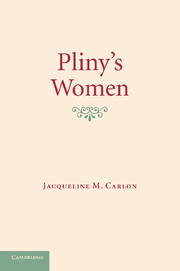Book contents
- Frontmatter
- Contents
- Preface
- List of Abbreviations
- Introduction
- 1 Pliny: Enemy of Tyrants
- 2 Pliny: Model Protégé
- 3 Pliny: Champion of the Vulnerable
- 4 Pliny: Creator of the Ideal Wife
- 5 Pliny: Arbiter of Virtue
- Conclusions
- Appendix A Stemmata
- Appendix B Women in Pliny's Letters
- Appendix C Frequency of Personal Pronouns and Possessive Adjectives in Pliny's Letters
- Bibliography
- Index Locorum
- General Index
Introduction
Published online by Cambridge University Press: 13 January 2010
- Frontmatter
- Contents
- Preface
- List of Abbreviations
- Introduction
- 1 Pliny: Enemy of Tyrants
- 2 Pliny: Model Protégé
- 3 Pliny: Champion of the Vulnerable
- 4 Pliny: Creator of the Ideal Wife
- 5 Pliny: Arbiter of Virtue
- Conclusions
- Appendix A Stemmata
- Appendix B Women in Pliny's Letters
- Appendix C Frequency of Personal Pronouns and Possessive Adjectives in Pliny's Letters
- Bibliography
- Index Locorum
- General Index
Summary
mihi nisi praemium aeternitatis ante oculos, pingue illud altumque otium placeat.
Pliny, Epistulae 9.3That life of rich and profound ease would be pleasing to me if the reward of immortality were not before my eyes.
As it became an institution in its second century, the principate forever transformed the lives of Rome's elite, leaving little room for dissent and an empire that would shortly cease to pine for the glory days of the republic. Fame was not to be achieved by deliberating legislation in the senate; great military victories on the battlefield were few, and those became triumphs not for the general but for the emperor, who celebrated them all, even if he had never appeared on the battlefield. Indeed, what glory there was for a man lay in becoming a member of the senate, when the emperor chose to recognize and reward his talent. Further honor might come in the awarding of office, culminating in the receipt of one or more consulships, a hollow office whose only assets were the cachet of the title and the opportunity to offer thanks to the emperor in oratorical form – the gratiarum actio. But the memory of a speech or of service to the state was fleeting, easily replaced by that of the next powerful orator or adviser.
- Type
- Chapter
- Information
- Pliny's WomenConstructing Virtue and Creating Identity in the Roman World, pp. 1 - 17Publisher: Cambridge University PressPrint publication year: 2009



